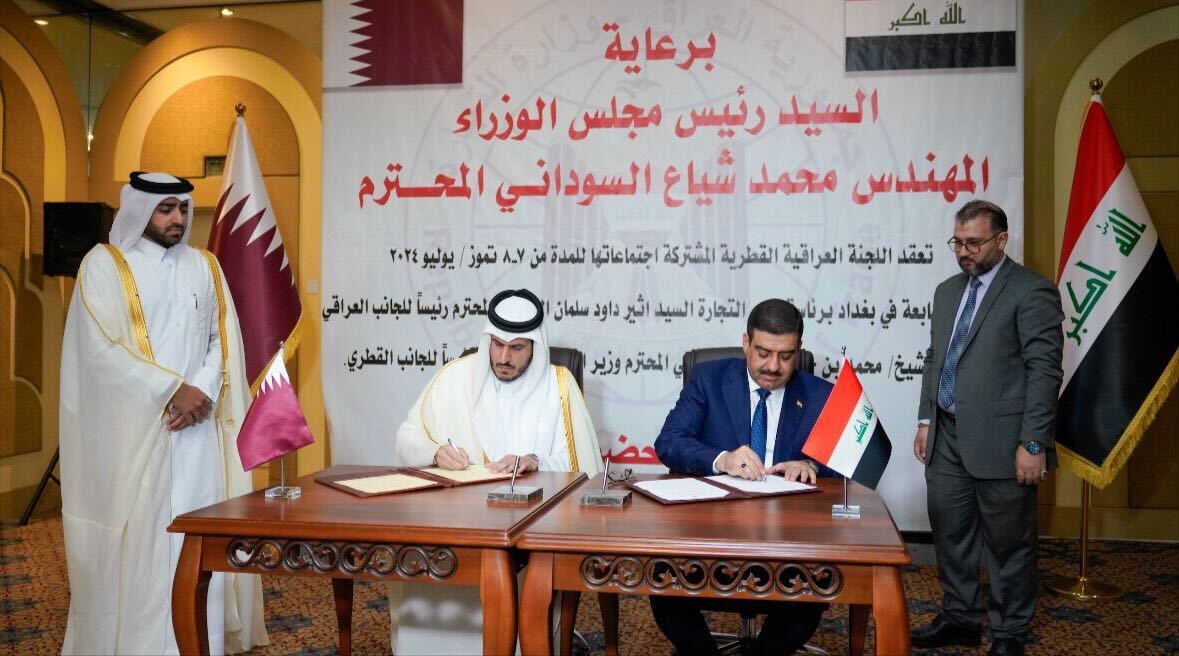In 2021, Qatar and Iraq agreed to reactivate the committee during the visit of Qatar’s current Prime Minister and Minister of Foreign Affairs Sheikh Mohammed bin Abdulrahman Al-Thani to Baghdad.
The Qatari-Iraqi Joint Committee for Economic and Trade Cooperation has explored prospects for the expansion of economic relations amid growing investments from Doha in Baghdad.
The committee’s seventh meeting took place in Baghdad on Monday under the chairmanship of Qatar’s Minister of Commerce and Industry, Sheikh Mohammed bin Hamad bin Qassim Al-Thani, and Iraq’s Minister of Commerce, Atheer Al Ghurairi.
According to Qatar’s state news agency (QNA), Doha and Baghdad discussed the mutual commitment to enhancing their bilateral cooperation. The Qatari minister noted that the “deep-rooted” trade relations with Iraq “serve as a catalyst for strengthening and deepening economic” cooperation.
“The committee meeting highlighted the economic potential and promising investment environment in both countries, presenting significant opportunities for the Qatari and Iraqi private sectors to build partnerships,” QNA reported.
According to QNA, some of the investment opportunities both sides discussed included those within industry, infrastructure, renewable energy projects, digital transformation, financial and logistics services among others.
The joint committee was established in 2013, but the meetings were paused the following year amid growing instability in Iraq.
In 2021, Qatar and Iraq agreed to reactivate the committee during the visit of Qatar’s current Prime Minister and Minister of Foreign Affairs Sheikh Mohammed bin Abdulrahman Al-Thani to Baghdad.
Last year, Qatar and Iraq’s trade volume reached QAR 497m ($136.2m), up from QAR 404m (around $110.7m) in 2022.
Qatar’s growing investments in Iraq
The two countries’ relations witnessed significant growth following the visit of Qatar’s Amir Sheikh Tamim bin Hamad Al-Thani to Iraq last year.
At the time, three Qatari companies and Iraq’s National Investment Commission agreed to develop $9.5bn worth of projects in Baghdad.
The projects included the construction of power plants that would generate 2,400 megawatts of electricity under a 25-year partnership between UCC Holding and the investment commission at the cost of $2.5bn.
Estithmar Holding had also signed deals worth $7bn for projects that covered real estate, tourism and hospitality, as well as management and operation of several hospitals.
Some of the projects included the development of two modern residential cities of an estimated two million units.
Other projects also included the development of 5-star hotels in distinct locations across Iraq that are expected to contribute to meeting rising demands in the Iraqi hospitality sector.
The Doha-based company established its subsidiary Elegancia Healthcare and a new branch of Elegancia Marine in Iraq.
“This implements Estithmar Holding’s strategy to signify its commitment to the global expansion to increase shareholder value, within the framework of the close strategic relations between the two countries,” the firm said in a statement in August 2023.
During the same month, Estithmar announced that it finalised the preliminary designs for ‘Rixos Baghdad’, a “landmark” tourist village it intends to construct in the Iraqi capital.
Then, in April, Qatar alongside Turkiye, Iraq and the United Arab Emirates signed a four-way Memorandum of Understanding to establish the $17bn Development Road project, aimed at linking the Gulf and Europe through Turkiye.
The signing took place in Baghdad in the presence of Turkish President Recep Tayyip Erdogan and Iraq’s Prime Minister Mohammed Shia Al-Sudani. Qatar was represented at the signing by its Minister of Transport Jassim bin Saif Al Sulaiti.
The MoU also included the development of Al Faw Port, Iraq’s key port that would be linked to Turkiye.
The project will be carried out in three phases, with the first expected to be completed by 2028. The second phase would be completed by 2033 and the third by 2050.
Historically, Iraq was known as “the land between two rivers” as it connected the Tigris and the Euphrates, an ancient trade route between the Persian Gulf and the Mediterranean.
In 1950, Iraq, Turkiye and Syria developed the trade route, though it was damaged during the Persian Gulf war in 1991 and faced further disruption in 2003—when the United States invaded Iraq.
For years, especially after the deadly U.S. invasion, Iraq has struggled to rebuild the country and the reconstruction had cost $213bn.







